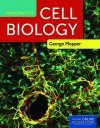![Principles of Cell Biology Principles of Cell Biology]()
Click to have a closer look
About this book
Contents
Biography
Related titles
Recommended titles
About this book
Written for the undergraduate Cell Biology course, Principles of Cell Biology provides students with an accessible approach to the fundamental concepts of cell biology. The text focuses on the underlying principles that illustrate both how cells function as well as how we study them. It identifies 10 specific principles of Cell Biology, and devotes a separate chapter to illustrate each. The result is a shift away from the traditional focus on technical details and towards a more integrative view of cellular activity that is flexible and can be tailored to suit students with a broad range of backgrounds. An informal, narrative writing style makes even the most complex concepts accessible to students new to the scientific field, including eliminating much of the technical complexity that many students find intimidating.
Contents
Chapter 1 What Is a Cell?
Chapter 2 Nucleic Acids
Chapter 3 Proteins and Polypeptides
Chapter 4 Phospholipids and Membrane Structure
Chapter 5 The Cytoskeleton and Cellular Architecture
Chapter 6 The Extracellular Matrix and Cell Junctions
Chapter 7 The Nucleus and DNA Replication
Chapter 8 Protein Synthesis and Sorting
Chapter 9 The Endomembrane System and Membrane Trafficking
Chapter 10 Cellular Metabolism and Energy Storage
Chapter 11 Signal Transduction and Cellular Communication
Chapter 12 Control of Gene Expression
Chapter 13 The Birth and Death of Cells
Chapter 14 Tissues
Customer Reviews
Biography
George Plopper is a Professor in the Department of Biology at Rensselaer Polytechnic Institute in Troy, New York. He received his Bachelor of Arts in General Biology from the University of California, San Diego. He completed his PhD in Cell & Developmental Biology at Harvard University, then completed his postdoctoral training in Cell Biology at The Scripps Research Institute in La Jolla, California. Dr. Plopper served as Assistant Professor at The University of Nevada, Las Vegas before moving to his present position at Rensselaer Polytechnic Institute. He has taught cell biology to undergraduate and graduate students since 1985, receiving four teaching awards. He was named a National Academies Education Fellow in the Life Sciences by the National Academy of Sciences in 2004.




























